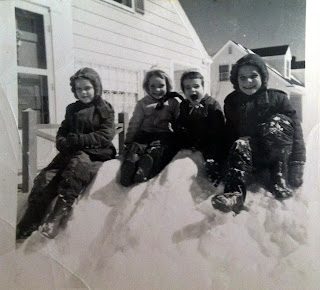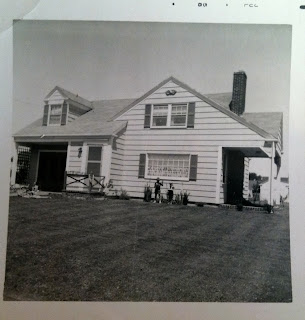In May of 2012 I traveled north to Maine with my sister and her husband. Our destination was their cabin on Watchic Pond.
David and I installed the dock in the frigid water as mosquitos attacked our flesh. The entire operation lasted an hour and neither of us complained about the cold. We even celebrated the completion of the task with a total immersion. My sister had towels waiting for us.
She loved us both, but really loved David.
Our teeth chattered from the long stay in the lake and our bodies were on the edge of hypothermia.
“Go take a hot shower,” she ordered in her sternest professor voice.
David and I obeyed without question. Ten minutes under a hot shower in the first-floor bathroom brought feeling back to my muscles and the skin stopped stinging after fifteen. David remained in the upstairs bathroom for another five minutes, since his water pressure suffered from my usage.
“How about a ride into Portland?” My sister offered after I dressed in dry clothing. “Just you and me.”
“What about your husband?” I get along with my brother-in-law. Some people say that we look alike. Both of us have our hair, which is a miracle for men almost 60.
“He’s has some more chores to do before he can take a break. We’ll drive by our old house on Falmouth Foresides and then head into Portland to get steamers.” My sis knew my weak spots. She forgave all my shortcomings and they were more than I could count on one hand.
“Sounds like a plan.” I hadn’t seen the house on McKinley Road in over twenty years. I shouted to David that we were leaving and he yelled to be back before sunset. The retired corporate headhunter liked to eat early.
Traffic on 25 from Standish to Portland was light even for a Sunday. We reached US 1 in forty minutes and crossed the Penobscot River Bridge.
The Harbor was becalmed by the windless afternoon. and not a single wave rippled the ocean passage between Cushing Island and Portland Head Light.
“Looks the same as always.” The parking lot of the B&M Bean factory was crowded with pick-up trucks. Beans sold well in the Great Recession days.
“Like when we were kids.” My sister drove a little faster than the speed limit. She had inherited her heavy foot on the gas from our late father. Falmouth Foresides lay on the other end of the Martin Point Bridge.
Our childhood was anchored in the middle of the 20th Century. Cars had been bigger in the 50s. Most of them had been manufactured in Detroit.
“There aren’t any new houses and the old Civil War fort still guards against the rebels.”
“It’s called Fort Gorges and it wasn’t finished until after the Civil War.” My sister had a better retention of history, especially since I filled in the blanks with guessses.
“Here’s our street.” My sister turned into the quiet neighborhood. “When we were kids, everyone was outside on a day like this.”
“We’re baby-boomers. People have less kids now.”
“Mom also exiled us from the house during daylight.” She slowed the car to a crawl on our old street. “Kids stay home and play videos or surf the internet. Outside sports are uncool.”
“This is our house.” The owners of # 12 had expanded the two-story dwelling. The breezeway connecting the garage to the kitchen was enclosed by walls. I had jumped out the bedroom window into a deep snowdrift. The family behind us had belonged to the Davis family. Their daughter was the best baseball player in town back in the summer of 1959.
“Brings back lots of memories.”
She didn’t stop until the end of the street.
I got out of the car. My sister phoned her husband. I walked across the grassy verge.
The dock at the bottom of the bluff was gone as were the lobster boats. A few buoys marked the location of the remaining traps. I returned to the car.
“What now?”
“We could walk around Mackworth Island.” The fir-covered island was connected to our neighborhood by a causeway.
“They allow people on the island?” Our parents had warned us against approaching the bridge. Older kids told scary stories about the deaf school on the island. Bad things happened to the students. No one said how bad. “We were all scared of the school station wagon. It had bars on the window.”
“The school is still operating, but it’s open to the public on the weekends. There is a hiking path around the shore.”
“Let’s go. You know when I was a kid, I heard stories about Mackworth Island.”
“I remember them. There was a scandal in the early 80s. The teachers beat students to force them to speak rather than use sign language. There was a settlement, but the state refused to give the money to the victims.” My sister was a college professor. She loved her profession and her voice quivered at the thought of the long history of mistreatment on the island. “That’s over now, but not for those who suffered from the abuse.”
We parked in the lot and strolled around the island. It was low tide. I picked up the sea’s offerings off the rocky beach.
We passed the stone boat pier and followed the path through the tall pines to discover that over the last years children had been erecting small dwellings for the fairies of Mackworth Island.
“What for?” asked my sister.”
“Maybe they’re for the souls of those poor kids.”
“So many?”
“When people are bad, they are very bad, especially if they have the support of the State.”
I added my findings to a small birch wood structure and we returned to the car. Her husband was eager for us to return. He loved steamers.
Upon my return to New York I googled Mackworth Island and found ‘WHY I HATE MACKWORTH ISLAND’ by Richard Wormwood. His sister had been a student at the Deaf School. The young girl had suffered at the hands of the teachers and students. None of her tormentors were punished with jail sentences. The principal knew the location of too many skeletons.
I wrote Richard Wormwood that week.
Dear Richard
I am sorry for your sister’s pain.
Seeing those little fairy houses I thought of those children. They sadly were not alone.
Our family moved to the South Shore of Boston in 1960. My friend’s sister attended a Catholic school for the deaf. Jannie could read lips and tell jokes in her own way, but she lived outside of us. One day I found her crying and asked why. She shook her head, but after a few minutes Jannie confided that the nuns were torturing her and the rest of the kids.
I told my parents.
They didn’t believe me.
I called the police.
I was 11.
The next Sunday after Mass the parish priest cautioned me about spreading rumors.
My friend’s sister was transferred to a public school.
I don’t know what happened to her, but think about her often.
Your story brought back many memories and like you I hope that justice is meted out somewhere along the line.
The truly bad do not deserve happy endings.
Peter Nolan Smith
www.mangozeen.com
To read Richard Wormwood’s article please go to the following URL
http://www.portlandphoenix.com/features/top/ts_multi/documents/03885664.asp










